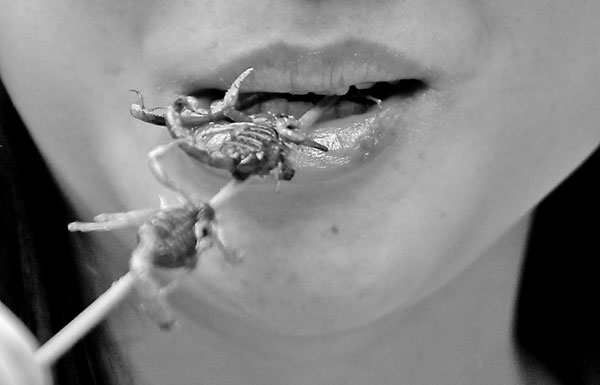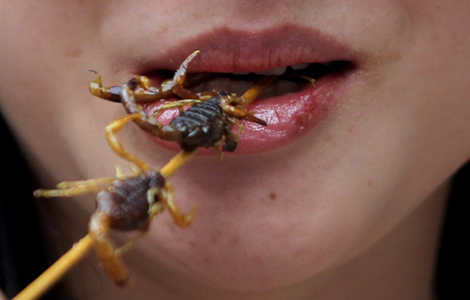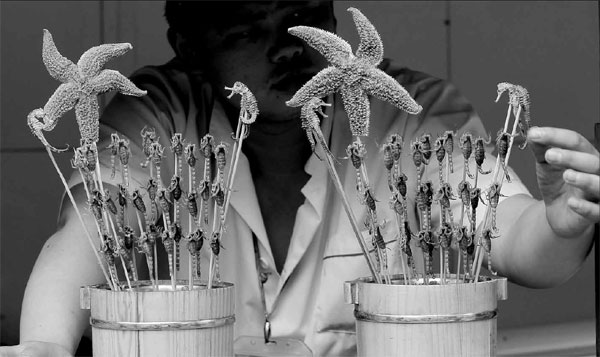A southern staple
Updated: 2013-10-04 07:34
By Li Wenfang in Guangzhou (China Daily)
|
||||||||
Eating bugs might disgust most consumers around the world, but not in Guangdong province
In a research report released earlier this year, the United Nations Food and Agricultural Organization said eating insects could help end food shortages across the world. In fact, it urged people to eat them as a nutritious supplement.
And while that might be news - and perhaps disgusting - to some, southern Chinese people have long known that bugs, whether crunchy or squishy, big or small, are not only tasty and filling, but great sources of nutrients.
Insects are a delicacy for many southern Chinese people, especially in Guangdong province, where they have a saying that "there are no four-legged things that they don't eat except tables and there are no winged things they don't eat except planes".
|
A vender sells snacks made of scorpions and other insects in May on Wangfujing Street in Beijing. Insects are a popular delicacy for many people in southern China, especially those in Guangdong province. Wang Jing / China Daily |
Insects are available uncooked at wet markets or served at restaurants, including the sipunculus nudus, also known as peanut worms; cicada pupae and larvae; diving beetles; scorpions; bamboo weevil larvae; and locusts.
Southern Chinese, who often practice food therapy, associate each kind of bug with a different nutritional quality. Worms generally provide a lot of protein and a delicate taste while the diving beetle apparently strengthens the kidneys. It's said that peanut worms nourish the blood and scorpions lower body heat and detoxify the body.
One of the fundamental ideas behind traditional Chinese medicine is that there are certain foods that have a heat-inducing quality while others cool your body. Achieving a balance is key to staving off illness or diseases. In TCM verbiage, it is the balance of the yin (the cool, calming side of the body) and the yang (the hot, stimulating side of the body) energies in the body.
In Zhanjiang, Guangdong province, peanut worms are abundantly harvested in shoals, the shallow parts of a body of water. Zhanjiang restaurants clean the worms and clear them of sand by first turning them inside out with a metal wire equipped with a small hook. They are either steamed with chopped garlic and glass noodles, fried like French fries or boiled in rice porridge.
"They are a bit expensive, like 50 yuan ($8) per kilogram, but they're cheaper after a typhoon because many are washed ashore. A dish of peanut worms is a must at important meals, such as a wedding banquet or at a celebration to christen a new house," said Zhang Li, a Zhanjiang resident.
She said peanut worms are nutritious and taste fresh and sweet in rice porridge. Dried peanut worms are also available and can be used in soup to give it a medicinal quality.
Cicada pupae and locusts are usually deep-fried while cicada larvae are usually stir-fried with vegetables, such as preserved turnip, and chilies.
Marine worms, available only in May and August, are often baked with eggs. Diving beetles can be cooked in pepper and salt or with specialty soy sauces.
Xiao Feng, a resident of Guangzhou, said she was fed diving beetles when she was a child to strengthen her kidneys and better control urination.
Scorpions are often cooked in soup and recommended by traditional Chinese medicine doctors to cancer patients. Traditional Chinese medicine doctors believe the poison of the scorpion's stinger will combat the cancer, making the critter a key ingredient in TCM.
"We make scorpion soup every month on average but one cannot drink too much of it," said Chen Yingkui, another resident of Guangzhou.
Chen added that eating scorpions acts more as a preventative measure against illnesses than as a cure.
Though her diet is on the side of daring, she admits she still feels uneasy eating marine worms, which have multiple tiny feet, if they are not shredded and steamed with egg.
In the province, bamboo weevil larvae are available from October through February. It is a specialty in Guangning, where there are more than 72,000 hectares of bamboo forests.
Huang Zhongkang, former president of the Wuchuan TCM Hospital in Zhanjiang, said each aforementioned insect serves a specific purpose for the body.
Peanut worms strengthen the kidneys, but they should not be consumed if a person has a cold, fever, inflammation of the kidneys or an allergy. Scorpions clear and activate the main and vascular channels and treat headaches.
Though the insects may appear disgusting, that doesn't mean they come cheap. At a Guangzhou wet market, peanut worms were selling for 90 yuan a kilogram; cicada larvae, 240 yuan; cicada pupae, 280 yuan; black diving beetles, 80 yuan; scorpions, 760 yuan; and marine worms, 200 yuan.
Zhuang Na contributed to this story.
liwenfang@chinadaily.com.cn
|
 A woman eats fried scorpions in May on Wangfujing Street. It's said that scorpions lower body heat and detoxify the body. Wang Jing / China Daily |
(China Daily USA 10/04/2013 page16)

 Driver shot dead in car chase at US Capitol
Driver shot dead in car chase at US Capitol
 NY SUV driver's wife: We were in 'grave danger'
NY SUV driver's wife: We were in 'grave danger'
 Death toll in sunk boat off Italy could top 200
Death toll in sunk boat off Italy could top 200
 A southern staple
A southern staple
 Tropical Storm Karen aims for US Gulf Coast
Tropical Storm Karen aims for US Gulf Coast
 City rush, island time
City rush, island time
 Death toll in Italy migrant boat wreck rises to 94
Death toll in Italy migrant boat wreck rises to 94
 Lang Lang: First Chinese winner of Classic Brits Award
Lang Lang: First Chinese winner of Classic Brits Award
Most Viewed
Editor's Picks

|

|

|

|

|

|
Today's Top News
DC shutdown gets social media all in a twitter
Hotels aside, AVIC needs to grow its service arm
Gunfire forces brief lockdown at US Capitol
Mutual help the best: IMF chief
A new 'maritime silk road' called for
Chinese investment in US grows
'Bourgeoise' iPhone rules
Obama cancels APEC trip due to gov't shutdown
US Weekly

|

|







